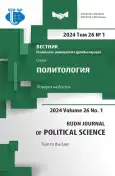Turkey and Pan-Turkism Influence on the Development of New National Identities in the Caspian Region: The Evidence from Turkmenistan and Kazakhstan
- Authors: Romanova A.P.1, Chernichkin D.A.1
-
Affiliations:
- Astrakhan Tatishchev State University
- Issue: Vol 26, No 1 (2024): Turn to the East
- Pages: 181-206
- Section: PROBLEMS OF REGIONAL INTEGRATION AND IMAGE POLICY
- URL: https://journal-vniispk.ru/2313-1438/article/view/322455
- DOI: https://doi.org/10.22363/2313-1438-2024-26-1-181-206
- EDN: https://elibrary.ru/MKNAJA
- ID: 322455
Cite item
Abstract
The article focuses on how Turkey and Pan-Turkish ideology influenced the development of new national identities in Kazakhstan and Turkmenistan and the results of this influence. The theoretical basis of this study lies in the concept of transnational political spaces (ethno-worlds), which form new identities due to the spread of cultural patterns. The practical basis of this study entails a synthesis of several sociological methods: content analysis of data published from January 2, 2022, to July 31, 2023, collected according to specified criteria; surveys in the form of an electronic questionnaire; and a set of focused group and expert interviews attended by citizens of Kazakhstan and Turkmenistan. The results showed that “soft power” in both countries influences the field of those policies that are crucial for the development of new identities: education, language, memory, symbology, etc. The mechanisms for promoting identity politics in Turkic countries are the main strength of the formation process in this ethno-world. The results of the study demonstrate educational programs to be the most effective tool, whose status allows the returned youth to become a part of a new elite in their countries, as well as emissaries of Pan-Turkist ideas. Based on the content analysis data, it can be noted that though TurkishKazakh and Turkish-Turkmen relations are actively and positively developing, primarily in the economic sphere, they still have certain contradictions. Though Pan-Turkish ideas and Turkish cultural patterns are presented in the information agendas of the analyzed countries, they are not their trends.
About the authors
Anna P. Romanova
Astrakhan Tatishchev State University
Email: aromanova_mail@mail.ru
ORCID iD: 0000-0001-8537-4893
SPIN-code: 9637-1465
Doctor of Philosophy, Professor, Director of the Research Center for Problems of the South of Russia and the Caspian Region
Astrakhan, Russian FederationDmitriy A. Chernichkin
Astrakhan Tatishchev State University
Author for correspondence.
Email: chernichkin95@mail.ru
ORCID iD: 0000-0002-9647-7916
SPIN-code: 9037-9800
Researcher at the Center for the Study of Problems of Complex Security of the Caspian Macro-region and Reaction Terrorism and Extremism
Astrakhan, Russian FederationReferences
- Adji, M. (1998). Europe. Türks. Great Steppe. Moscow: “Mysl”, 334 p. (In Russian)
- Aminov, E.R. (2020). Specifics of network interaction between supporters of radical pan-Turkism. Black Sea region. History, politics, culture, 29, 28–36. https://doi.org/10.35103/SMSU.2020.18.15.004 (In Russian)
- Arsharuni, A., & Gabidullin, H. (1931). Essays on Pan-Islamism and Pan-Turkism in Russia. Moscow: Bezbozhnik. (In Russian)
- Arteev, S.P. (2023). Ethnocultural and diaspora worlds. Identity: personality, society, politics. New contours of the research field (I.S. Semenenko ed.) Moscow: Publishing house “Ves Mir”, 134–144. (In Russian)
- Avatkov, V., & Ryzhenkov, A.(2022). Turkmenistan and Turkic-centric integration. Russia and the New States of Eurasia, I (LIV), 68–85. (InRussian) https://doi.org/10.20542/2073-4786-2022-1-68-85
- Avatkov, V.A. (2020). Foreign policy of the Turkish Republic within the framework of the modern system of international relations. PhD pol. sci. diss. Moscow, 387 p.
- Avatkov, V.A. (2021). Post-Soviet space and Turkey: results of 30 years. Contours of Global Transformations: Politics, Economics, Law, 14, 5, 162–176. (In Russian)
- Badretdinova, S.A. & Badretdinov, I.R. (2021). Formation and development of the system of tools and institutions of “soft power” in Turkey at the turn of the 20th-21st centuries (on the example of relations with Turkic-speaking regions). Manuscript, 14 (9), 1830–1838. (In Russian)
- Imomaliev, A.A. (2021). Features of the development of the ideology of Pan-Turkism in the 21st century. Trends in the development of science and education, 69–2, 153–155. (In Russian). https://doi.org/10.18411/lj-01-2021-83
- Miller, A.F. (1958). Fiftieth anniversary of the Young Turk revolution. Moscow: Knowledge, 48 p. (In Russian)
- Milyukova, A.G., Kovaleva, A.V., & Valyulina, E.V. (2021). Pan-Turkism and geopolitical identity in the modern Eurasian space: analysis of representations in the media. World Politics, 1, 25–38. (In Russian). https://doi.org/10.25136/2409-8671.2021.1.34970
- Mukhametdinov, R.F. (2016). Yusuf Akchura in the era of change. Simbirsk Scientific Bulletin, 1 (23), 116–123. (In Russian)
- Nadein-Raevsky, V.A. (2017). Pan-Turkism: ideology, history, politics. Expansionist doctrine: from the Ottoman Empire to the present day and the fate of Turkey, Russia and Armenia. Moscow: Publishing House “Russian Panorama”, 316 p. (In Russian)
- Nasibova, A.S. (2015). The evolution of the ideas of pan-Turkism in the foreign policy of the Turkish Republic. Modern Eurasian Studies, 3, 113–118. (In Russian)
- Pritchin, S. (2022). Political crisis in Kazakhstan. Russia and the New States of Eurasia, I (LIV), 56–67. (In Russian). https://doi.org/10.20542/2073-4786-2022-1-56-67
- Romanova A.P., Chernichkin D.A. RUDN Journal of Political Science, 2024, 26(1), 181–206
- Semenenko, I.S. (2022). The Turkic world in a school textbook: near borders, distant horizons... IMEMO RAS URL: https://www.imemo.ru/publications/ policy-briefs/text/the-turkic-world-in-a-school-textbook-near-frontiers-distan t-horizons (accessed: September 12, 2023). (In Russian)
- Sigachev, M.I., & Arteev, S.P. (2022) The Portuguese world as a transnational space: political dimension. South Russian Journal of Social Sciences, 23, 2, 37–51. (In Russian)
- Shumilov, M.M. (2022a). The influence of pan-Turkism on the formation of the political identity of the Turkic-speaking states of Central Asia in the 21st century (Part 1). Management consulting, 6, 36–53. (In Russian)
- Shumilov, M.M. (2022b). The influence of pan-Turkism on the formation of the political identity of the Turkic-speaking states of Central Asia in the 21st century (Part 2). Management consulting, 7, 37–49. (In Russian)
- Svarants, A. (2010). The main threats to the interests of the Russian Federation from the ideology and policy of Pan-Turkism (external and internal aspects). Region and World, 1, 3–11. (In Russian)
- Tveritinova, A.S. (1957). The Young Turks and Pan-Turkism. Byzantine Temporary. Leningrad. (In Russian)
- Vakhitova, G.A. (2007). Political Islam in Turkey: neo-Ottomanism and pan-Turkism. Bulletin of the Kyrgyz-Russian Slavic University, 7, 2, 96–99. (In Russian)
Supplementary files









